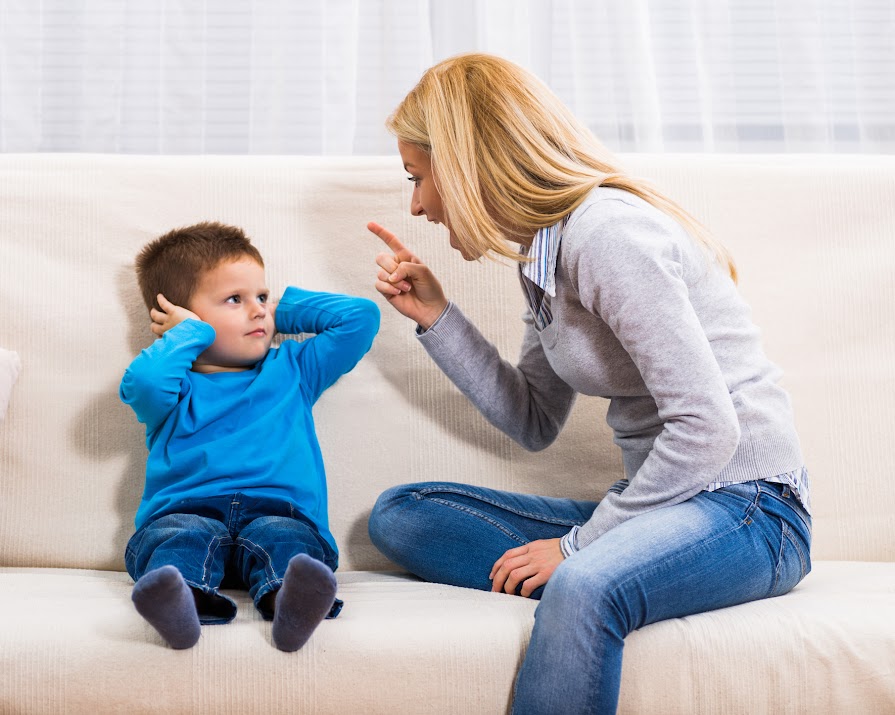
For parents: 3 steps to help your child (and you) boost emotional regulation
By IMAGE
16th Sep 2019
16th Sep 2019
As part of a new parenting series, clinical psychologist, coach and mum Julie Meehan will be tackling the issue she often deals with in her sessions with parents and children. This week, we look at emotional regulation.
In my work with children of all ages and their parents, the central theme that we return to time and time again is how we can work with our “Big Emotions”. This is what psychologists call “emotional regulation”.
Emotional regulation is the skill we develop to regulate our intense emotional experiences – or Big Emotions. It is the capacity to be okay with whatever emotions we are feeling and to be able to show and act on them in a safe and hopefully helpful way for ourselves and others.
It may sound easy, but we all know that being okay with our own emotions, let alone our children’s, is one of the most challenging aspects of being a parent that there is. Not only that, but learning how to regulate our own emotions in our relationships with our children is one of our most important roles we have as parents. It is a skill that our children, in some part, learn from us.
Big emotions
That may sound scary and in some ways it is, because so many of us struggle to find a helpful expression to our own emotions, especially when we are in the middle of a really emotionally challenging exchange with our children.
“I have found myself in this place countless times – shouting, saying ridiculous and childish stuff to my children that I normally would never dream of saying.”
In fact, scientific studies of the brain show that when we are experiencing a Big Emotion such as anger or fear, the part of the brain that helps us to stay rational and generally calm shuts down. This allows the part of our brains that are governed by our emotions to take over.
Have you have ever found yourself ‘losing it’ during some heated exchange with your child and afterwards berating yourself for the ‘irrational’ person you became? Most of us have. What happened is that you literally lost the function of a part of your brain that usually allows you to be more rational and calm – more like the ‘you’ you normally are. I know I have found myself in this place countless times – shouting, saying ridiculous and childish stuff to my children that I normally would never dream of saying. What’s more, I usually hate myself for being that way.
Knowing that part of my brain has temporarily shut down now helps me to at least partially forgive myself, if not at the time, but later.
It also helps me to apply some techniques that help the brain to start to work in harmony again, which helps me to feel more okay with my feelings, and in so doing helps my children to learn how to regulate their emotions too.
So, here we’ll move onto the useful tools.
3 steps towards emotional regulation
So the next time you find yourself ‘losing it’ in a heated or challenging exchange with your child, here are a few steps you can take to help you and your child emotionally regulate again.
1. Remove to reconnet
Remove yourself to reconnect with yourself: for the brain to come into harmony again, we need to give the part that usually allows us to be relatively rational and calm (the ‘you’ you are when you are not experiencing a big emotion) a chance to come on-stream again.
Often, especially if there are really big emotions happening, this can only happen by removing yourself from the situation you are in with your child, as it breaks the cycle of heated emotional interactions.
“Giving yourself space actually soothes the whole of your nervous system.”
If you find that your big emotions have taken over, and your thoughts have become muddy or one-tracked, the best thing you can do is to stop, take a breath and leave the room. You might want to say, ‘I need a few minutes to feel okay again’, so that your child knows what you are doing.
Giving yourself this space actually soothes the whole of your nervous system. Only then can that part of the brain begin to reconnect and can we reconnect with ourselves again.
2. Name it to tame it
‘Naming it to tame it’ is a wonderful phrase used by psychiatrist and author Dr Dan Siegel to point us to the power of naming big emotions when they happen. Studies of the brain have revealed that when we use the language part of our brains to name our own emotions, for example, ‘I’m feeling really angry’ it actually helps to calm the part of your brain that is allowing your emotions to run wild.
“Don’t tell your child what they are feeling, because you can’t actually know, but you can be curious, and make a best guess.”
What’s more, when we help our children to name their emotions, this helps their systems in the very same way. So, once you have found enough space to reconnect with yourself, you can start to reconnect with your child by saying something like, ‘I wonder if you are feeling really angry about what just happened’.
The important thing here is that you don’t tell them what they are feeling, because you can’t actually know, but you can be curious, and make a best guess.
3. Reconnect and repair
Reconnect with your child and repair: Once you have reconnected with yourself, at least partially, and named the big emotions, your system may be calm enough to attempt to repair the rupture that might have happened with your child.
“Acknowledge how your own big feelings took over, and how you are now seeking to show that to your child and to say sorry.”
This is the opportunity to acknowledge how your own big feelings took over, and how you are now seeking to show that to your child and to say sorry.
No one can predict how your child will react, but what’s important is that you are showing your child that you ‘lost it’ and that you are now in a better place again to connect in a calmer way.
Self-forgiveness
Nothing in parenting is as simple as a three-step plan, and it is rarely that linear or goes that smoothly. With practice and lots of self-forgiveness however, these techniques can go a long way to help you to regulate your own big emotions, and in turn, you give your child the capacity to develop one of the most important life skills of all: to be okay with their emotions and ultimately with whatever comes their way in life.
Dr Julie Meehan is a clinical psychologist, parent coach, work?shop facilitator and mum. She works offers individual parenting support sessions online and in person, as well as workshops nationwide. She lives in the northwest with her two children, her ‘very greatest’ teachers. For more: www.juliemeehan.com
Julie is offering a workshop for parents of primary school-aged children on ‘How to Support your Child to Navigate Big Over-whelming Emotions’ on Saturday September 28th in the Margaret Aylward Centre in Glasnevin, Dublin 11. 10am-5pm. For more details and to book online visit http://juliemeehan.com/
Photograph: Getty Images
Read more: When everything seems too much…
Read more: Your relationship with your child is different as a single parent
Read more: Helping your child with separation anxiety























